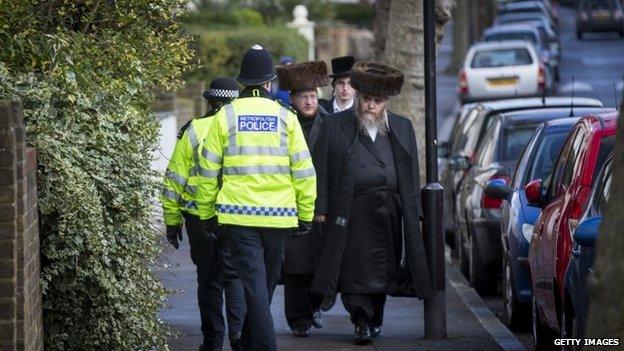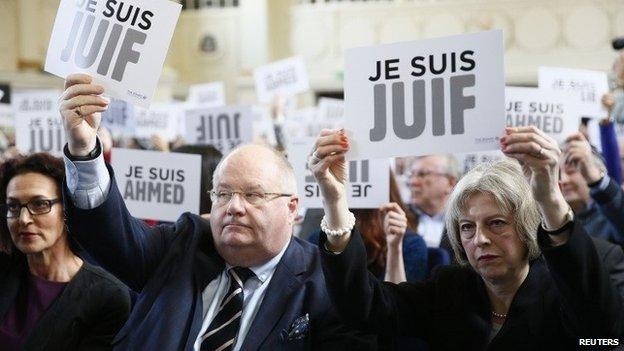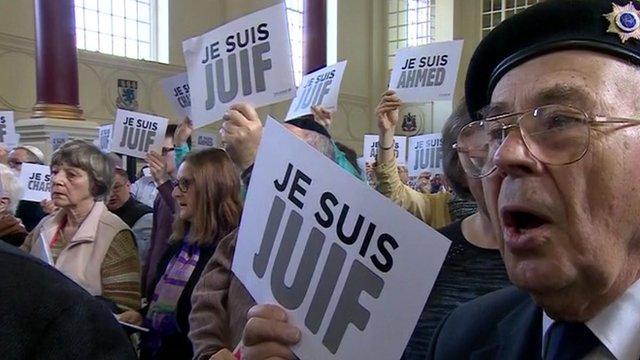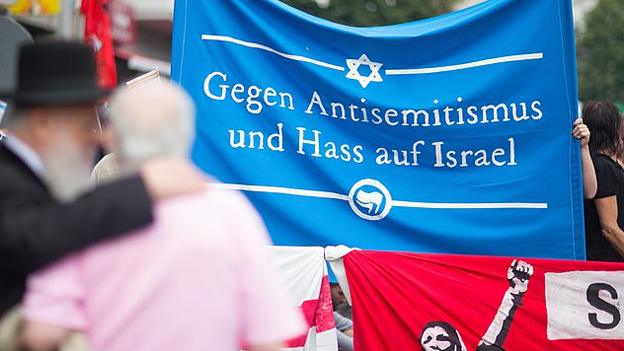UK must do more to 'wipe out' anti-Semitism - May
- Published
Theresa May: "We must all redouble our efforts to wipe out anti-Semitism"
The UK must redouble its efforts to "wipe out anti-Semitism", Home Secretary Theresa May has said.
Mrs May said she "never thought I'd see the day when members of the Jewish community" would be "fearful" of staying in the UK.
She was speaking at a service in London to remember those killed in the terror attacks in France this month, including four people in a kosher supermarket.
Police say there is "heightened concern" about risks to Jewish people.
The president of the Board of Deputies of British Jews, Vivian Wineman, welcomed the home secretary's speech, saying Jews in the UK should be alert to the terror threat but not alarmed.
'Vulnerable and fearful'
Mrs May said the attack on the supermarket in France was "a chilling reminder of anti-Semitism, not just in France but the recent anti-Semitic prejudice that we sadly have seen in this country".
Those attending the service sang prayers and held up signs
"I know that many Jewish people in this country are feeling vulnerable and fearful and you're saying that you're anxious for your families, for your children and yourselves," she continued.
"I never thought I would see the day when members of the Jewish community in the United Kingdom would say they were fearful of remaining here in the United Kingdom."
"And that means we must all redouble our efforts to wipe out anti-Semitism here in the United Kingdom," she said.
The UK's threat level remains severe, which means a terrorist attack is highly likely.
On Friday Met Police assistant commissioner Mark Rowley, the national policing lead for counter-terrorism, said a security review was being carried out in the UK in the aftermath of the attacks in France.
He said police were holding talks over "more patrols in key areas" following concern from the Jewish community and after "anti-Semitic rhetoric from extremists" in France and elsewhere.

The Met has increased its patrols in areas with large Jewish communities
Speaking after Sunday's service, organised by the Board of Deputies of British Jews, Mr Wineman welcomed the decision to increase police protection for the Jewish community.
He said: "Of course there is a real terrorist threat. People shouldn't be alarmed, they should be alert but not alarmed. There is a threat but don't exaggerate it."
When asked if British Jews were moving to Israel because of the terror threat, he said there had always been a steady stream going and they went for positive reasons to express their Jewish identity.
He said that the British Jewish community was "very happy here" and that the "vast majority of British people were not anti-Semitic".
Jonathan Sacerdoti, from the Campaign Against Anti-Semitism UK, said the terror threat was not just against Jews, but was "a threat against Britain".
"We are not running scared and we are not running away. We are here to stay, and we are here to say that it is time Britain stands up to this," he said.
British identity
In a letter read out at the commemoration service in London, Mayor Boris Johnson said: "I've set a clear expectation that the police treat all harassment and hate crime offences very seriously."
Speaking at the service, Communities Secretary Eric Pickles said that education was the way to tackle anti-Semitism.

Eric Pickles and Theresa May held up signs saying "I am Jewish" at a Board of Deputies of British Jews event
Afterwards he added: "We know that in Paris a pensioner, a rabbi's son, a teacher and a shop assistant were wiped out because they were Jewish.
"And if history tells us anything, we need to be constantly vigilant."
He has written to more than 1,000 Islamic leaders at mosques in England urging them to help "explain and demonstrate how faith in Islam can be part of British identity".
Mr Pickles said he was "proud" of the way British Muslims in Britain had responded to the Paris attacks but there was "more work to do".
"You, as faith leaders, are in a unique position in our society. You have a precious opportunity, and an important responsibility," he said.
Later, the Muslim Council of Britain said it had not been sent the letter but would be writing to Mr Pickles to ask that he "clarifies his request".
Deputy secretary general Harun Khan said: "Is Mr Pickles seriously suggesting, as do members of the far right, that Muslims and Islam are inherently apart from British society?
Mr Khan said Muslim communities around the country have "redoubled their efforts to bring communities together and defy extremists of all kinds" following the Paris attacks.
In an attack on the satirical magazine Charlie Hebdo in Paris on 7 January, militant Islamists killed eight journalists, two police officers, and two other people.
Two days later, an Islamist gunman killed four Jewish men in a kosher supermarket in the city. The same gunman is believed to have shot a policewoman the day before.
- Published18 January 2015

- Published21 August 2014
